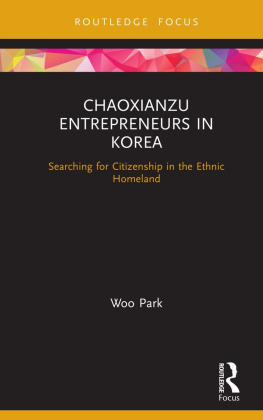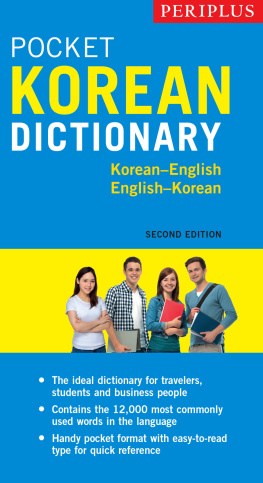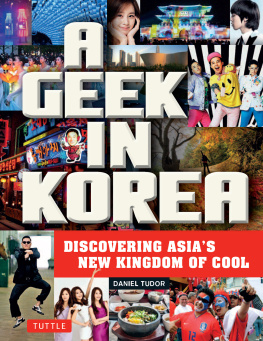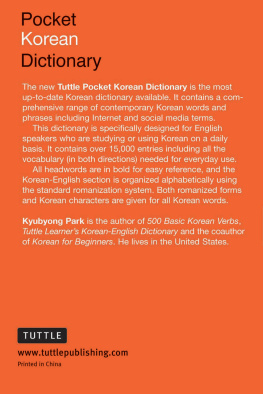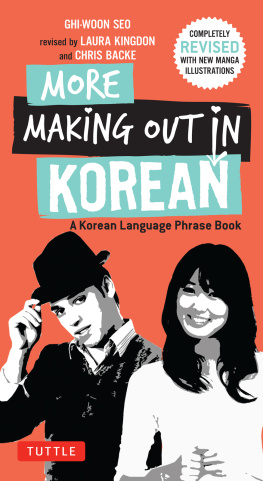Chaoxianzu Entrepreneurs in Korea
This book explores the nature of the state-citizen societal relationship in Korea during the transition to neoliberalism, through the lenses of class and nationalism.
Examining the process by which a new class, Korean Chinese entrepreneurs, emerged from Korean Chinese enclaves in South Korea and quickly became a leading group within those communities, this book provides a case study of the entrepreneurs running a variety of businesses, including restaurants, travel agencies and trading companies. Whilst Korean Chinese people faced discrimination and stigmatization in Korea, despite their economic contributions to the economy, this book demonstrates how entrepreneurs began to form associations and organisations, campaigning for their equal status in Korean society. Arguing that the formation of these was closely linked to the framework of legal statuses established by the Korean state as it sought to make use of Korean Chinese labour, this book explains how social citizenship was constituted by the interaction between their situational sense of fairness and the contradictory economic and social roles expected of them by the state.
Drawing on fifteen years of ethnographical experience, Chaoxianzu Entrepreneurs in Korea will be useful to students and scholars of sociology, anthropology, Migration Studies and Ethnic Studies, as well as Korean Studies.
Woo Park is Assistant Professor in the Department of Liberal Art and Science at Hansung University, South Korea. He studied at Yanbian University in China and received his MA and Ph.D. in sociology from Seoul National University.
Routledge Focus on Asia
1 The Abe Administration and Rise of the Prime Ministerial Executive
Aurelia George Mulgan
2 Heritage Revitalisation for Tourism in Hong Kong
The Role of Interpretative Planning
Chris White
3 Prisons and Forced Labour in Japan
The Colonization of Hokkaido, 18811894
Pia Maria Jolliffe
4 Chaoxianzu Entrepreneurs in Korea
Searching for Citizenship in the Ethnic Homeland
Woo Park
First published 2020
by Routledge
2 Park Square, Milton Park, Abingdon, Oxon OX14 4RN
and by Routledge
52 Vanderbilt Avenue, New York, NY 10017
Routledge is an imprint of the Taylor & Francis Group, an informa business
2020 Woo Park
The right of Woo Park to be identified as author of this work has been asserted by him in accordance with sections 77 and 78 of the Copyright, Designs and Patents Act 1988.
All rights reserved. No part of this book may be reprinted or reproduced or utilised in any form or by any electronic, mechanical, or other means, now known or hereafter invented, including photocopying and recording, or in any information storage or retrieval system, without permission in writing from the publishers.
Trademark notice: Product or corporate names may be trademarks or registered trademarks, and are used only for identification and explanation without intent to infringe.
British Library Cataloguing-in-Publication Data
A catalogue record for this book is available from the British Library
Library of Congress Cataloging-in-Publication Data
A catalog record has been requested for this book
ISBN: 978-0-367-90076-2 (hbk)
ISBN: 978-1-003-02377-7 (ebk)
Typeset in Times New Roman
by codeMantra
For my lovely family
Since 2000, South Korea has started to become a so-called multicultural society. One part of this phenomenon was the Korean Chinese, who are ethnically Korean but embodied Chinese culture. The Korean Chinese formed a kind of enclave in the Southwest Seoul that became the centre of their socio-economic life. As the Korean Chinese population grew, the community experienced economic differentiation. Korean Chinese enclave entrepreneurs emerged from a community of Korean Chinese migrant workers. These entrepreneurs ran a variety of businesses, including restaurants, travel agencies, and trading companies.
I have 15 years of ethnographical experience in this field. Since 2005 (based on my fieldwork), I have identified the formation of a new class in South Korea made up of Korean Chinese entrepreneurs. This is a very interesting phenomenon an immigrant (or the returnee) petty bourgeoisie class emerging in a late-capitalist (or neo-liberal) economy. Korean Chinese people faced discrimination and stigmatization in Korea despite their economic contributions to the Korean economy, but the entrepreneurs began to form associations and organizations which campaigned for equal status in Korean society. How was this possible, and what sociological (or social scientific) implications can be revealed through this phenomenon? This book aims to characterize citizenship in South Korea with the help of two classical variables of social science, class and nationalism (ethnicity), both of which were key to the relationship between the South Korean state and the Korean Chinese entrepreneurs during the neo-liberal transformation.
In preparing the current book, I received tremendous intellectual support from Professor Chang Kyung-Sup. His book South Korea under Compressed Modernity: Familial Political Economy in Transition (2010), which systematically conceptualized the East Asian modernity, had the biggest impact on me. Also, when I was an assistant in the Institute for Social Development and Policy Research in Seoul National University, the ISDPR hosted an international conference and the articles of the conference were published as an academic book titled Contested Citizenship in East Asia: Developmental Politics, National Unity, and Globalization (2012), edited by Chang Kyung-Sup and Bryan S. Turner. As an assistant, it was an honour to learn a lot from the contributors. In recent years, South Korea in Transition: Politics and Culture of Citizenship (2014), which collects research on the characteristic of citizenship in South Korea in one volume, was also a very important influence. In 2018, I had the priceless opportunity to attend an international conference on Developmental Citizenship(s) in China: Social Governance and Developmental Politics in Citizenship Perspective, held at Seoul National University. This conference and its attendees helped me to understand aspects of Chinas citizenship regime. Having learned from many of the scholars mentioned above, I determined that I could do research people moving between Korea and China (even within East Asia). This phenomenon can be termed the Asianization of Asia.
My colleague Robert Easthope was in charge of editing and correcting the manuscript and making it publishable. Lucid comment and suggestions offered by peer reviewers made the theoretical implications and limitations of the proposed manuscript much clearer. Also, the kind and friendly guidance of Routledges Stephanie Rogers and Georgina Bishop was essential to publish the work as a book. Finally, I was able to complete this book thanks to the excellent research environment provided by Hansung University.
My wife, Rany, and my son, Justin, are the spiritual pillars supporting my research. To them, I dedicate this book.
2008FSSVES2008 Factual Survey on the Satisfaction of Visiting and Employment System2008SKCE2008 Survey on the Korean Chinese Enclave2013SBG2013 Survey on the Business of Garibong-dong2013SKCLS2013 Survey of Korean Chinese Living in SeoulAILOKAct on the Immigration and Legal Status of Overseas KoreanCKCACentral Korean Chinese AssemblyEMSEmployment and Management SystemEPSEmployment Permit SystemFLEAForeign Laborer Employment ActFLPCForeign Laborer Policy CommitteeGAKCAGeneral Assembly of Korean Compatriots AssociationGICGuro Industrial ComplexGPCGlobalization Promotion CommitteeICAImmigration Control ActITTSIndustrial Technical Training SystemKCAKorean Chinese AssociationKCCKorean Chinese CommitteeKCEMAKorea-China Entrepreneurship and Management AssociationKCMAKorean Compatriot Merchant AssociationKCNKorean Chinese Students NetworkKCTAKorea-China Trade AssociationKCTNKorean Chinese Town NewspaperKCWMCKorean Chinese Welfare Mission CentreKDWPKorean Diplomatic White PaperKEFKorea Employers FederationKFSMBKorea Federation of Small and Medium BusinessKISSKorean Immigration Service StatisticKRAKorean Returnees AssociationMCIMinistry of Commerce and IndustryMOJMinistry of JusticeMOLMinistry of LaborOGPCOffice for Government Policy CoordinationOKFOverseas Korean FoundationOKFAOverseas Korean Foundation ActSMBASmall and Medium Business AdministrationTESTraining and Employment SystemUAKCUnited Association of Korean ChineseUVSUnited Volunteer ServiceVESVisiting and Employment System

